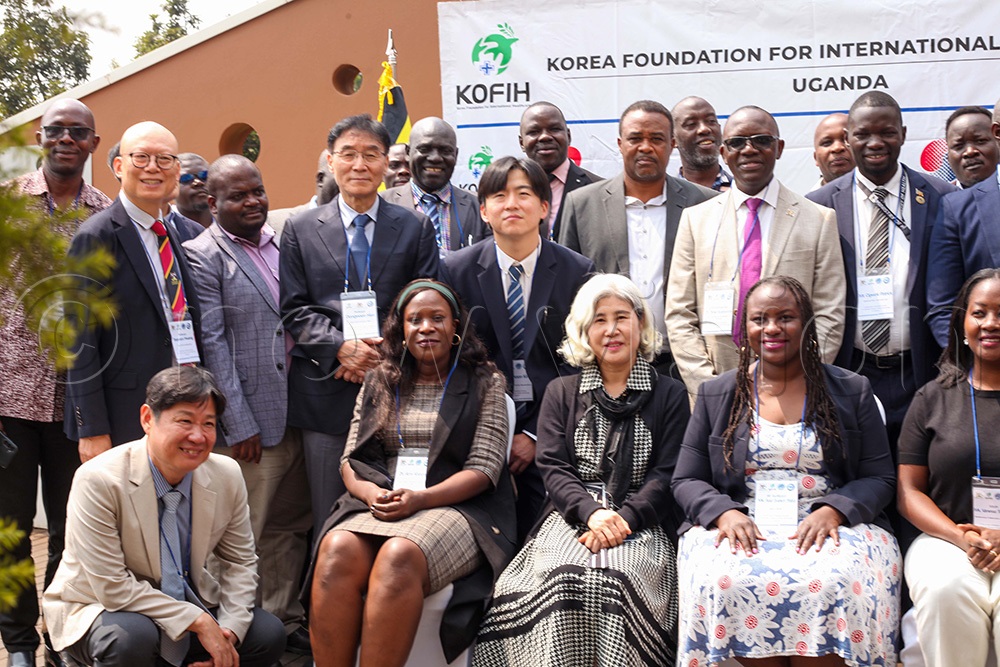South Korea’s sh28.3b programme boosts Uganda’s disease detection capacity
The five-year program, which began in 2022 and runs until 2026, has focused on strengthening health systems through establishing emergency operation centres, enhancing laboratory infrastructure, training health workers, and building stronger community health networks.
Dr Dohoon Kim, the Korea Foundation for International Healthcare (KOFIH) Country Director, speaking during a review meeting. (Photo by John Musenze)
_______________
Uganda’s ability to detect and respond to infectious diseases has greatly improved over the last three years, thanks to a 28.39 billion ($8 million) investment by the Korea Foundation for International Healthcare (KOFIH).
The five-year program, which began in 2022 and runs until 2026, has focused on strengthening health systems through establishing emergency operation centres, enhancing laboratory infrastructure, training health workers, and building stronger community health networks.
At a midterm review meeting held at Onomo Hotel in Kampala on August 21, KOFIH officials and Uganda’s Ministry of Health praised the collaboration, saying it has already transformed outbreak preparedness in many parts of the country.
Dr Dohoon Kim, KOFIH’s Country Director, said Uganda has made strides in infection control, especially in central Uganda, where emergency operation centres are now fully equipped and responding faster than before.
“We have seen real progress in the last three years. Notification and detection of outbreaks are becoming swifter, and the supply of diagnostic tools is much more reliable,” he said.
Dr Daniel Kyabayinze, Director of Public Health at the Ministry of Health, welcomed the partnership and said Uganda has received critical funding from KOFIH for Mpox control, vaccination drives, and community health worker empowerment.
At a midterm review meeting held at Onomo Hotel in Kampala , KOFIH officials and Uganda’s Ministry of Health praised the collaboration, saying it has already transformed outbreak preparedness in many parts of the country. (Photo by John Musenze)
“Over $1 million has gone directly into Mpox prevention and other infectious disease programs. This support has strengthened our health workforce through training in leadership and specialised services, which is a long-term investment in Uganda’s public health system.” Dr Kyabayinze noted.
Ministry of Health officials representing benefiting regions like Masaka and Mubende highlighted Uganda’s quick detection and response to recent outbreaks as evidence of the program’s impact.
Dr Dansan Atim, a senior health officer in the epidemiology department, pointed to the anthrax outbreak in Mubende District, which was identified within a day and contained in three days.
“We also responded with similar speed when Mpox was first reported,” he said.
The partnership is also opening doors for innovation. Dr Alex Riolexus Ario, Director of the Uganda National Institute of Public Health, revealed that Uganda is exploring the use of Artificial Intelligence (AI) to strengthen disease surveillance and data collection.
“While we still face challenges such as limited human resources and some facilities using paper systems, we see technology as the key to accuracy and timeliness in the future,” he said.
KOFIH officials acknowledged that challenges remain but emphasised that Uganda’s progress in outbreak control shows the program’s potential to achieve even more in its remaining years.
Dr Kyabayinze stressed that such international partnerships are vital in safeguarding both Uganda and its neighbours. “We cannot prevent outbreaks in isolation,” he said.
“The support from partners like KOFIH ensures that Uganda is not only protecting its own citizens but also contributing to regional and global health security.”
As the program heads into its final two years, both sides are optimistic that the progress already achieved, especially in rapid outbreak response and workforce training, will lay a strong foundation for Uganda’s long-term resilience against infectious diseases, according to Dr Alex Riolexus Ario.